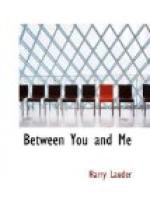But I was no so old, ye’ll be mindin’, and I won’t say I was not fearsome, too. It’s a queer feelin’ ye have when ye first go doon into a pit. The sun’s gone, and the light, and it seems like the air’s gone from your lungs with them. I carried a gauze lamp, but the bit flicker of it was worse than useless—it made it harder for me to see, instead of easier. The pressure’s what ye feel; it’s like to be chokin’ ye until you’re used to it. And then the black, damp walls, pressin’ in, as if they were great hands aching to be at your throat! Oh, I’m tellin’ ye there’s lots of things pleasanter than goin’ doon into a coal pit for the first time.
I mind, since then, I’ve gone doon far deeper than ever we did at Hamilton. At Butte, in Montana, in America, I went doon three thousand feet—more than half a mile, mind ye! There they find copper, and good copper, at that depth. But they took me doon there in an express elevator. I had no time to be afeared before we were doon, walkin’ along a broad, dry gallery, as well lighted as Broadway or the Strand, with electric lights, and great fans to keep the air cool and dry. It’s different, minin’ so, to what it was when I was a boy at Hamilton.
But I’m minded, when I think of Butte, and the great copper mines there, of the thing I’m chiefly thinking of in writing this book.
I was in Butte during the war—after America had come in. ’Deed, and it was just before the Huns made their last bid, and thought to break the British line. Ye mind yon days in the spring of 1918? Anxious days, sad days. And in the war we all were fighting, copper counted for nigh as much as men. The miners there in Butte were fighting the Hun as surely as if they’d been at Cantigny or Chateau-Thierry.
Never had there been such pay in Butte as in yon time. I sang at a great theatre one of the greatest in all the western country. It was crowded at every performance. The folk sat on the stage, so deep packed, so close together, there was scarce room for my walk around. Ye mind how I fool ye, when I’m singin’, by walkin’ round and round the stage after a verse? It’s my way of givin’ short measure—save that folk seem to like to see me do it!
Weel, there was that great mining city, where the copper that was so needed for munitions was being mined. The men were well paid. Yet there was discontent. Agitators were at work among them, stirring up trouble, seeking to take their minds off their work and hurt the production of the copper that was needed to save the lives of men like those who were digging it out of the ground. They were thinkin’, there, in yon days, that men could live for themselves and by themselves.
But, thank God, it was only a few who thought so. The great lot of the men were sound, and they did grand work. And they found their reward, too—as men always do when they do their work well and think of what it means.
There were others in Butte, too, who were thinking only of themselves. Some of them hung one of the agitators, whiles before I was there. They had not thought, any more than had the foolish men among the workers, how each of us is dependent upon others, of the debts that every day brings us, that we owe to all humanity.




